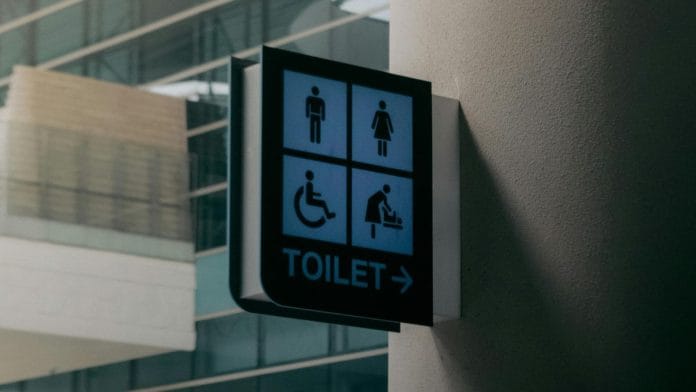New Delhi: The Supreme Court has directed high courts, state governments and Union Territories to ensure the construction and availability of separate toilet facilities for men, women, persons with disabilities (PwD) and transgender persons across all courts and tribunals in the country.
Acting on a plea filed by Rajeeb Kalita in 2023, which sought a direction to all states and UTs to ensure basic toilet facilities across courts and tribunals, a bench of Justices J.B. Pardiwala and R. Mahadevan Wednesday passed a slew of directions, which included allocation of sufficient funds for construction and maintenance of such toilets, ensuring presence of stocked sanitary-pad dispensers and grievance redressal mechanisms to lodge complaints.
Emphasising that courts should not be places where basic needs, like sanitation, are overlooked and neglected, the court ruled, “The absence of adequate washroom facilities undermines equality and poses a barrier to the fair administration of justice.”
In its 34-page ruling, the two-judge bench noted that immediate steps are needed to ensure that all judicial premises, especially those lacking proper facilities, are equipped with accessible washroom facilities for judges, litigants, advocates and staff. “It is re-emphasised that this is not just a matter of convenience, but is about basic rights and human dignity. Failing to act promptly would compromise the very purpose and essence of the judiciary’s role in our society,” the court said.
The top court flagged that with respect to district courts, there are deep concerns related to instances where even judges, particularly, in rural areas, still lack access to proper washroom facilities. Adding that this violates not just the rights of affected persons, but also the judicial system’s reputation, the court said, “Failure to provide adequate washroom facilities is not just a logistical issue, but it reflects a deeper flaw in the justice system.”
The court also observed that this “sorry state of affairs” indicates the harsh reality that the judicial system has not entirely fulfilled its Constitutional obligation to provide a safe, dignified and equal environment for all those seeking justice.
Also Read: How a verandah has brought SC and Punjab & Haryana HC on different sides of the same fence
Directions issued
Firstly, the Supreme Court said that high courts and state governments/UTs shall ensure the construction and availability of separate toilet facilities for males, females, PwD and transgender persons on all court premises and tribunals across the country.
Secondly, high courts shall oversee and ensure that these facilities are identifiable and accessible to judges, advocates, litigants and court staff.
Thirdly, the court directed that a committee be constituted in each of the high courts under the chairmanship of a judge nominated by the chief justice and members, like registrar, chief secretary, PWD secretary and finance secretary of the concerned state, along with a representative of the Bar Association and any other officers as they deem fit, within six weeks’ time.
“The committee shall formulate a comprehensive plan, carry out the following tasks, and ensure its implementation,” the court added in its ruling.
It also directed that the committee should tally the number of people visiting the court every day, and ensure that sufficient washrooms are built and maintained.
Another direction given by the court was to provide alternate facilities, like mobile toilets during the construction of new ones, and environment-friendly toilets (bio-toilets) across the courts, in a fashion similar to the one shown by railways.
For women, transgender people and PwDs, the court directed for providing “clear signage and indications, along with functional amenities, such as water, electricity, operational flushes, provision of hand soap, napkins, toilet paper and up-to-date plumbing systems”.
Specifically, for PwDs, it directed for installation of ramps and designing of washrooms to accommodate them.
Mandatory and regular checks, child-safe washrooms and separate rooms catering to nursing mothers were also among the fifteen directions issued by the court.
The Supreme Court court also directed high courts to develop and sustain the quality of maintenance by creating a grading system for the district courts, and other courts or forums, under its supervision, providing certifications and motivating the appropriate officials and staff, which could form part of their service records.
Additionally, a status report must be filed within four months by all states, UTs and high courts. The case will be heard again after four months to check compliance with the apex court’s order.







The Supreme Court has no time for serious issues and cases. But all the time in the world for frivolous and jdiotic cases.